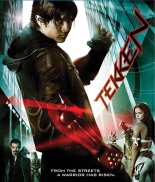
 Dwight H. Little is the director of Halloween 4: The Return of Michael Myers, Marked for Death and the new, live-action, video-game adaptation Tekken.
Dwight H. Little is the director of Halloween 4: The Return of Michael Myers, Marked for Death and the new, live-action, video-game adaptation Tekken.
FLICK ATTACK: Where did the H go? The credits just read “Dwight Little.”
LITTLE: I think it was after Rapid Fire, maybe. I got bored with it.
FLICK ATTACK: It’s been a lot of years since your last feature, so why Tekken?
LITTLE: It was a chance to re-collaborate with Alan McElroy, the screenwriter, who I did Halloween 4 and Rapid Fire with, and he and I have a great, common creative interest and rapport. I thought the Tekken world was a great platform for a martial arts movie. I had some success with Marked for Death and Rapid Fire, and it looked like it was in my area of expertise.
 FLICK ATTACK: Were you familiar with the video games at all?
FLICK ATTACK: Were you familiar with the video games at all?
LITTLE: Only in sort of a passing way. I wasn’t like a hardcore player, but my two boys are into it, so I get into it vicariously. There was a mythology about the family and the Tekken corporation like you get inspired by a short story or a novel. I also love the ever-changing, interactive fight designs, so that was visually interesting to me. I thought it’d be a way to freshen up the genre of a martial arts action movie.
FLICK ATTACK: So then how do approach turning a video game into a movie?
LITTLE: You look at the exiting source material and find the thing that makes you passionate or gets you excited. I made the movie like I would make Rocky or Gladiator: The goal is to make a good movie, not a good video game. You have to commit to the characters to keep viewers actively commited to the story. Poppy visuals are not going to do it for 100 minutes. Alan and I said, “You know what? Jin and his devil wings and the boxing kangaroo — let’s leave that for a CGI or an anime movie. Let’s leave these heavy supernatural items on the table.”
FLICK ATTACK: Are you disappointed it’s coming out on DVD instead of hitting theaters?
LITTLE: Sure, but that reflects the world we live in. This movie, made 10 years ago, obviously would have been released on 2,000 screens. To market and release a movie now national is a $35 million to $40 million commitment in marketing. Our world is changing so fast, but Tekken will be platformed on Blu-ray, on Redbox, on iTunes, on VOD and Netflix and pay-per-view, and that’s how movies go into the world unless it’s Warner Bros and they have that massive marketing muscle.
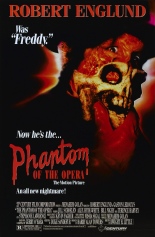 FLICK ATTACK: You know a movie of yours I really liked? The Phantom of the Opera.
FLICK ATTACK: You know a movie of yours I really liked? The Phantom of the Opera.
LITTLE: That was a movie that really kind of opened and closed without generating much interest at the time. It’s kind of startling to me, because on DVD, I guess it’s found a second life. I guess the reason is that movie is artistically very odd. You take a Robert Englund slasher movie and kind of do a mash-up with a very literary, opera-art movie, and put those two movies together. A lot of people really didn’t like it, but other people loved it, so it’s a challenging movie. If you’re a straight-up slasher movie, you’re suddenly going to be watching Faust on stage at the Budapest opera — I like it because of that, because it’s unpredictable.
FLICK ATTACK: So you’ve directed Freddy Krueger and Michael Myers. In a fight between those two, who’d win?
LITTLE: Between Freddy and Michael … Freddy’s too smart. He would outsmart Michael.
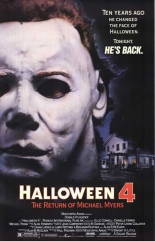 FLICK ATTACK: I think Halloween 4 is among the best of the sequels, but you never got to do another one since.
FLICK ATTACK: I think Halloween 4 is among the best of the sequels, but you never got to do another one since.
LITTLE: I think it’s time, honestly, to put it to bed. What Alan and I did is we went back to John Carpenter’s movie and said, “What made this movie?” And we just looked at it over and over and it was Jamie Lee Curtis and Donald Pleasence. If you have that investment in the characters and you care about them, then everything else is going to fall into place. That’s a movie. I think people sometimes lose sight — it’s just like in Tekken: If you find your way into Jin and his dilemma and his search for vengance against his mother’s death, then the rest of it, you’ll just follow him into the world.
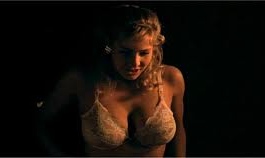 FLICK ATTACK: Yeah, but Tekken doesn’t have Kathleen Kinmont taking off her shirt.
FLICK ATTACK: Yeah, but Tekken doesn’t have Kathleen Kinmont taking off her shirt.
LITTLE: Yeah. —Rod Lott
Buy it at Amazon.
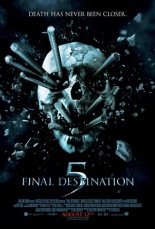 1. The characters work at a paper company experiencing hard economic times, to the point where their department may be shut down.
1. The characters work at a paper company experiencing hard economic times, to the point where their department may be shut down.

 Dwight H. Little is the director of
Dwight H. Little is the director of  FLICK ATTACK: Were you familiar with the video games at all?
FLICK ATTACK: Were you familiar with the video games at all? FLICK ATTACK: You know a movie of yours I really liked?
FLICK ATTACK: You know a movie of yours I really liked?  FLICK ATTACK: I think Halloween 4 is among the best of the sequels, but you never got to do another one since.
FLICK ATTACK: I think Halloween 4 is among the best of the sequels, but you never got to do another one since. FLICK ATTACK: Yeah, but Tekken doesn’t have Kathleen Kinmont taking off her shirt.
FLICK ATTACK: Yeah, but Tekken doesn’t have Kathleen Kinmont taking off her shirt.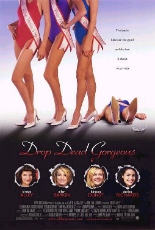
 When it first came out, the dark, beauty-pageant mockumentary
When it first came out, the dark, beauty-pageant mockumentary 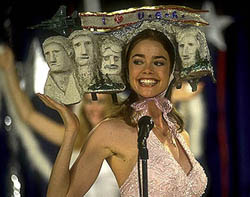 This uncanny coincidence causes the film’s many jabs at conservative “family values” to take on a newfound and occasionally disturbing piquancy. What may have once seemed overly broad now seems unfortunately believable in an age where conservative leaders such as Palin seriously decry the practice of advocating vegetables over junk food to school kids as a form of socialist liberal propaganda.
This uncanny coincidence causes the film’s many jabs at conservative “family values” to take on a newfound and occasionally disturbing piquancy. What may have once seemed overly broad now seems unfortunately believable in an age where conservative leaders such as Palin seriously decry the practice of advocating vegetables over junk food to school kids as a form of socialist liberal propaganda.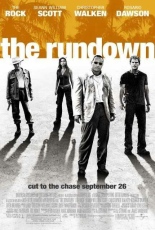
 Coming not-so-fresh off
Coming not-so-fresh off 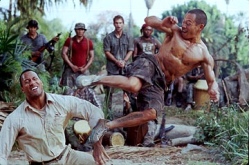 So The Rock and Scott get to bicker and spar like
So The Rock and Scott get to bicker and spar like 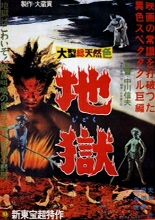
 At a time before the word “horror” even had a translated equivalent in Japan, writer/director Nobuo Nakagawa gave the country something to be all shook up about: a cinematic trip to Hell, and one full of gore of that!
At a time before the word “horror” even had a translated equivalent in Japan, writer/director Nobuo Nakagawa gave the country something to be all shook up about: a cinematic trip to Hell, and one full of gore of that! 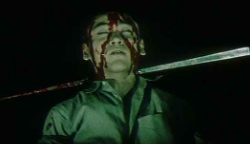 Finally, with a little more than half an hour to spare in the running time, he goes to Hell. Worse, Buddhists believe in a Hell comprised of eight Hells, so buckle up! Upon arrival, he gets his throat pierced, has to view a Your Life’s Greatest Fuck-Ups reel and learns just how hot flames of eternity can be. Shirô gets the 25-cent tour and sees the newly dead being flayed, boiled and spiked for punishment — different strokes for different folks, all rather graphically depicted with lots of red acrylic paint.
Finally, with a little more than half an hour to spare in the running time, he goes to Hell. Worse, Buddhists believe in a Hell comprised of eight Hells, so buckle up! Upon arrival, he gets his throat pierced, has to view a Your Life’s Greatest Fuck-Ups reel and learns just how hot flames of eternity can be. Shirô gets the 25-cent tour and sees the newly dead being flayed, boiled and spiked for punishment — different strokes for different folks, all rather graphically depicted with lots of red acrylic paint.